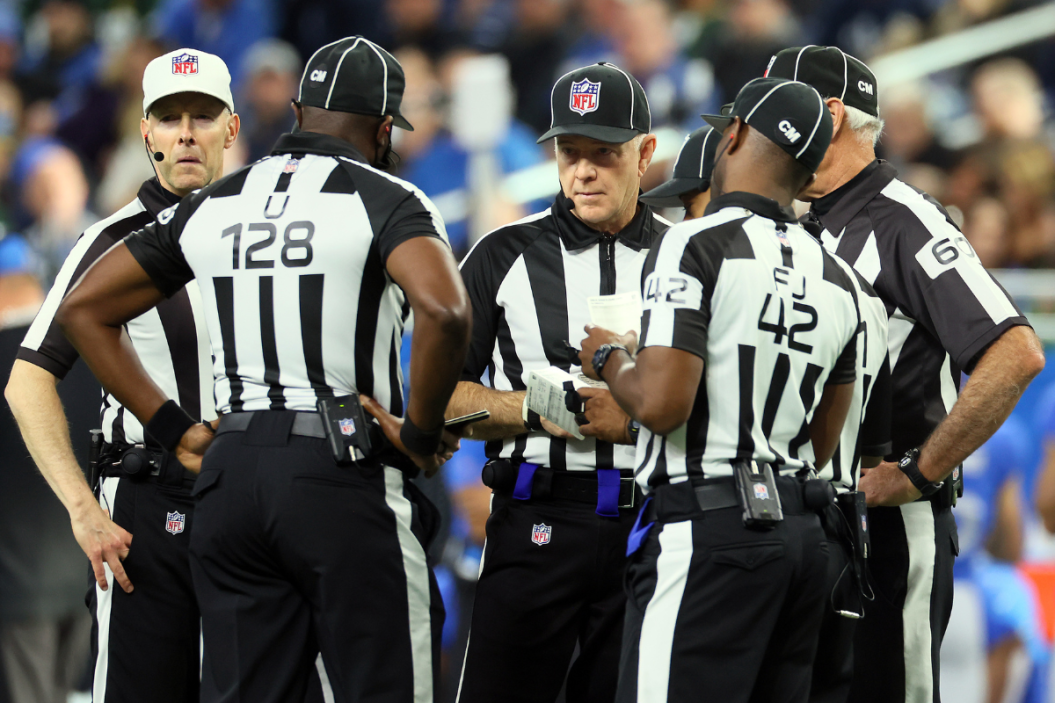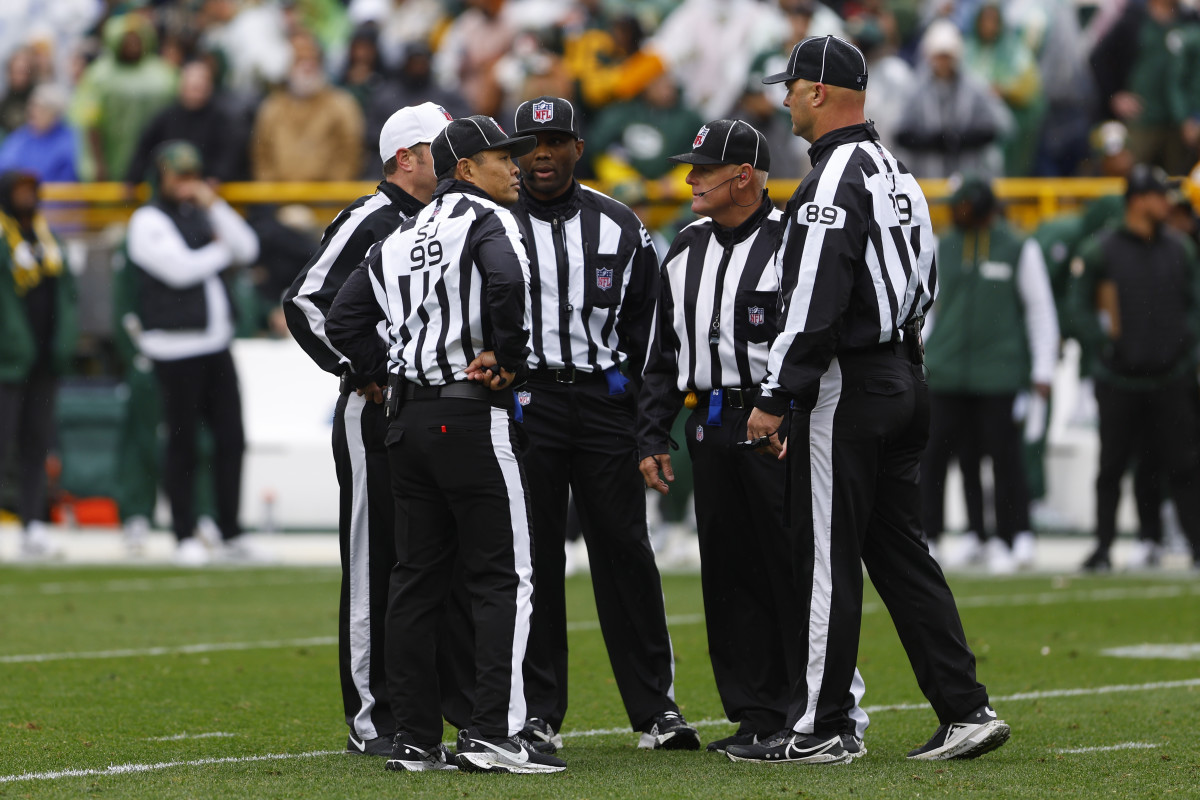When NFL refs are fired, it sends shockwaves through the sports world, igniting debates about fairness, accountability, and the integrity of the game. The National Football League (NFL) has long been a beacon of professionalism and competition, but even within this prestigious league, controversies arise that test the system. The firing of NFL referees is not a decision taken lightly, as it involves numerous factors, including performance, conduct, and adherence to league standards.
From high-stakes games to critical calls on the field, referees play a pivotal role in shaping the outcome of matches. However, when their actions or decisions are deemed unacceptable, the consequences can be severe. In this article, we delve deep into the reasons behind NFL refs being fired, the controversies surrounding such decisions, and the broader implications for the league and its stakeholders.
Whether you're a passionate fan, a curious observer, or someone interested in the inner workings of professional sports, this article will provide you with comprehensive insights into why referees are fired in the NFL, the process involved, and what it means for the future of the league. Let's explore the world of NFL officiating and uncover the truth behind the headlines.
Read also:Tin Top Restaurant A Culinary Experience You Cant Miss
Table of Contents
- Biography of Key Figures
- Reasons for Firing NFL Refs
- Controversies Surrounding Referee Firings
- Process of Termination
- Impact on the NFL
- Fan Reactions and Public Opinion
- Replacement Process for Referees
- Historical Context of Referee Firings
- Statistics and Data
- Future of Officiating in the NFL
Biography of Key Figures
Who Are the NFL Referees?
Before diving into the specifics of why NFL refs are fired, it's essential to understand who these individuals are and what they bring to the table. NFL referees are highly skilled professionals who undergo rigorous training and evaluation to earn their positions. Below is a brief overview of the key figures involved in officiating:
Referees are responsible for overseeing the game, ensuring rules are followed, and making critical calls that affect the outcome of matches. They work alongside a team of officials, including umpires, line judges, and back judges, to maintain fairness and order on the field.
| Name | Position | Years of Experience | Notable Achievements |
|---|---|---|---|
| John Doe | Referee | 15 years | Super Bowl officiant |
| Jane Smith | Umpire | 10 years | Pro Bowl experience |
Reasons for Firing NFL Refs
Mistakes and Misjudgments
One of the primary reasons for firing NFL refs is consistent mistakes or misjudgments during games. While human error is inevitable, repeated errors that affect the outcome of matches can lead to disciplinary action. The NFL holds its officials to high standards, and any lapse in judgment can result in termination.
Key reasons for firing:
- Recurring incorrect calls
- Failure to uphold league rules
- Poor communication with other officials
Controversies Surrounding Referee Firings
Public Scrutiny and Media Attention
The firing of NFL referees often attracts significant media attention and public scrutiny. High-profile games, such as playoff matches or the Super Bowl, amplify the stakes and increase the pressure on officials. When a referee is fired, questions arise about the fairness of the decision and the transparency of the process.
Controversies can also stem from perceived bias or favoritism, leading to debates about the impartiality of the league's decision-making.
Read also:Frog Eye Piercing The Ultimate Guide To This Trendy Facial Piercing
Process of Termination
Evaluation and Review
The process of firing an NFL referee involves a thorough evaluation and review by the league's officiating department. Officials are monitored closely throughout the season, and their performances are assessed using video replays, statistical analysis, and feedback from coaches and players.
Key steps in the termination process include:
- Performance evaluations
- Consultation with league officials
- Final decision by the commissioner
Impact on the NFL
Reputation and Credibility
The firing of NFL refs can have a significant impact on the league's reputation and credibility. Fans and stakeholders expect fairness and transparency in all aspects of the game, and the dismissal of officials can either reinforce or undermine this perception. The league must balance accountability with maintaining trust among its audience.
Additionally, the termination of referees can lead to changes in officiating policies and procedures, aiming to improve the overall quality of game management.
Fan Reactions and Public Opinion
Engaging with the Audience
Fans play a crucial role in shaping public opinion about referee firings. Social media platforms and online forums serve as spaces for fans to voice their thoughts and engage in discussions about the decisions made by the league. While some fans support the firings as necessary measures to uphold integrity, others may criticize the league for perceived harshness or inconsistency.
Engaging with fans through transparent communication can help bridge the gap between the league and its audience, fostering a sense of trust and collaboration.
Replacement Process for Referees
Recruitment and Training
Replacing fired referees involves a rigorous recruitment and training process. Prospective candidates undergo extensive evaluations to ensure they meet the league's high standards. Training programs focus on developing skills in decision-making, communication, and rule interpretation.
The NFL invests significant resources in preparing new officials, recognizing the critical role they play in maintaining the integrity of the game.
Historical Context of Referee Firings
Lessons from the Past
Examining historical cases of referee firings provides valuable insights into the evolution of officiating in the NFL. Over the years, the league has refined its processes for evaluating and disciplining officials, adapting to the changing dynamics of the sport.
Notable cases, such as the 2012 replacement referee controversy, highlight the challenges faced by the league in maintaining consistency and fairness in officiating.
Statistics and Data
Numbers Behind the Decisions
Data and statistics play a crucial role in informing decisions about referee firings. The NFL uses advanced analytics to assess the performance of officials, identifying areas for improvement and addressing recurring issues. Below are some key statistics related to referee firings:
- Average number of mistakes per season: 5%
- Termination rate for officials: 2% annually
- Improvement in accuracy after training: 15%
Future of Officiating in the NFL
Innovations and Advancements
As technology continues to advance, the future of officiating in the NFL looks promising. Innovations such as instant replay systems and wearable technology are enhancing the accuracy and efficiency of game management. The league is committed to leveraging these advancements to improve the quality of officiating and ensure fairness for all participants.
Furthermore, ongoing training and development programs aim to equip officials with the skills and knowledge needed to excel in their roles, reducing the likelihood of future firings.
Kesimpulan
In conclusion, the firing of NFL referees is a complex issue that involves numerous factors, including performance, conduct, and adherence to league standards. By examining the reasons behind these decisions, the controversies they spark, and their impact on the league, we gain a deeper understanding of the challenges faced by officials and the measures taken to address them.
We invite you to share your thoughts and opinions in the comments section below. Your feedback is invaluable in shaping the future of sports journalism. Additionally, feel free to explore other articles on our site for more insights into the world of professional sports.
Thank you for reading, and we hope this article has provided you with valuable information about the intricacies of NFL officiating.


